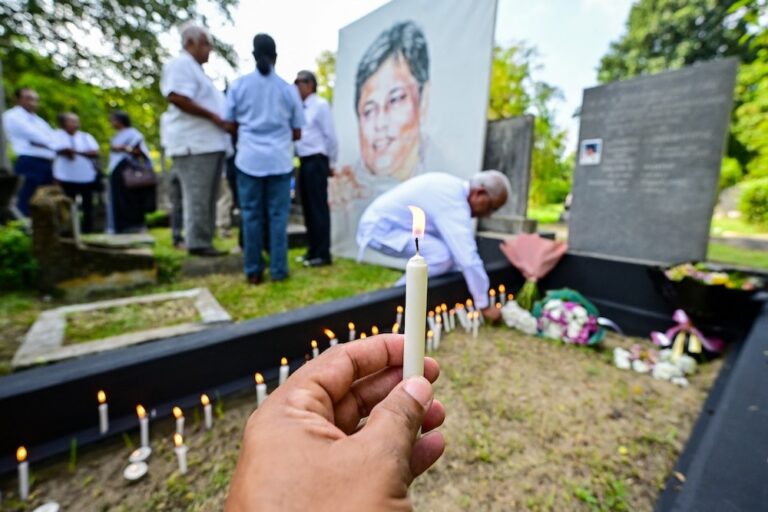(FMM/IFEX) – The following is a 16 December 2007 FMM press release: In the guise of telephone repairmen, police enter photojournalist’s residence 16 December 2007, Colombo, Sri Lanka – The FMM is disturbed to learn that officers of the Criminal Investigation Division (CID) visited the residence of senior Reuters photojournalist Anuruddha Lokuhapuarachchi in Sarojinee Watta, […]
(FMM/IFEX) – The following is a 16 December 2007 FMM press release:
In the guise of telephone repairmen, police enter photojournalist’s residence
16 December 2007, Colombo, Sri Lanka – The FMM is disturbed to learn that officers of the Criminal Investigation Division (CID) visited the residence of senior Reuters photojournalist Anuruddha Lokuhapuarachchi in Sarojinee Watta, Ratmalana, at 11:00 a.m. (local time) on 11 December and questioned his wife. Mr. Lokuhapuarachchi was away covering a cricket match in Colombo. Disguised as telephone repairpersons from the state telecoms provider Sri Lanka Telecom (SLT), they questioned his wife at length about his activities in a manner one would interrogate a suspect of a serious crime.
Saying that they were from SLT, the CID personnel first inquired after Mr. Lokuhapuarachchi from the gate and then insisted on checking his telephone (landline) as they had a list of contacts in the north and east to whom they wished to ascertain whether calls had been made. No identification cards were shown. When they were informed that Mr. Lokuhapuarachchi worked at Reuters, they pretended to not know this. Probing questions were asked about Mr. Lokuhapuarachchi’s family, his wife’s family and his parent’s family. Their chief interest was in how often and how recently Mr. Lokuhapuarachchi visited the embattled north and east. When they left at the end of this de facto interrogation, one of them showed his CID identity card.
The FMM finds this incredible behaviour of the CID yet another indicator of the culture of impunity and lawlessness that state authorities act under to quell media freedom. The CID knew full well that Mr. Lokuhapuarachchi was not at home. Their questioning was meaningless and should they wish to know details of his work and travel, Mr. Lokuhapuarachchi is easily contactable.
The FMM can only interpret this behaviour of the CID to be directly aimed at instilling fear and anxiety in the minds of not just Mr. Lokuhapuarachchi but all journalists who investigate and report on the conflict in Sri Lanka in a manner that does not toe the official line. The FMM is also disturbed by Mr. Lokuhapuarachchi’s revelation that his telephone conversations might have been tapped of late.
Sadly, the intimidation of journalists in wartime is not new in Sri Lanka. What is disturbing now is the degree to which the government, through its tacit support of these arbitrary actions by state authorities, including the military and police, gravely undermines media freedom and freedom of expression.
Intimidating journalists into silence is the mark of a totalitarian regime, the emergence of which in the south is cause for deep concern. The FMM deplores this incident and urgently calls upon the government to respect the right of journalists to independently, accurately and impartially carry out their duties.
The FMM also asks the government to establish clear guidelines for officials on questioning journalists in a manner that does not contravene their fundamental rights.


